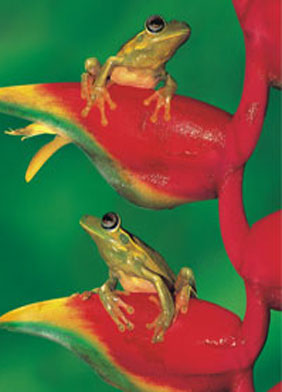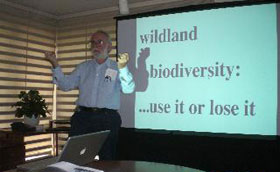 In late July, 2008, The Wege Foundation invited friends from several West Michigan foundations to meet University of Pennsylvania professor Dr. Dan Janzen and his wife Dr. Winnie Hallwachs Janzen and learn about their conservation work in the Costa Rican rain forest. Since Peter Wege first met the Janzens in 1991, The Wege Foundation has supported their work buying private land to be permanently preserved. The two Dr. Janzens have worked closely with the Costa Rican government to help the Central American country become the global leader in conserved park land relative to its size.
In late July, 2008, The Wege Foundation invited friends from several West Michigan foundations to meet University of Pennsylvania professor Dr. Dan Janzen and his wife Dr. Winnie Hallwachs Janzen and learn about their conservation work in the Costa Rican rain forest. Since Peter Wege first met the Janzens in 1991, The Wege Foundation has supported their work buying private land to be permanently preserved. The two Dr. Janzens have worked closely with the Costa Rican government to help the Central American country become the global leader in conserved park land relative to its size.
From the first small purchases of land in the Area de Conservacion Guanacaste in 1991 through 2005, The Wege Foundation has been the single best supporter among 8,500 other donors. Collectively, these donors have expanded the ACG parcel by parcel so by 2005, the ACG had grown to 376,380 acres—equal to 2% of the entire country! The ACG is now regarded as the leading example of tropical forest restoration in the world.
The importance of preserving this particular land mass, and the topic of Dr. Janzen’s talk to the foundation members, is that the ACG contains 4% of the world’s biodiversity. It is also home to 235,000 species—as many species as exist in all of North America! The professor of biology at the U of P is now part of an international initiative to analyze the DNA of every living species. Mapping out the DNA enables the scientists to then bar code that species to be catalogued for future research.
Dr. Janzen foresees the time when all ten million species of life can be googled through bar coding. He is using his expertise to bar code insects, with butterflies his particular specialty. The University of Guelph in Canada is doing the same for birds. For instance, if Dr. Janzen sends a Costa Rican bird’s feather to the
bar-coding biologists at Guelph, they can check the DNA and identify the species.
“We need to change all human relationships with wild things,” Dan Janzen explained. If humans can’t name a living thing, the professor believes, we won’t care about whether it lives or dies. But naming each species through bar coding gives it an identity so people will want to preserve it. He told The Wege Foundation guests that this project he calls “bioliteracy” will elevate the human spirit. “By sustaining and restoring biodiversity, we will rediscover our own humanity.”
Humanity is pressed for time, according to Janzen, if we are going to save species from man’s careless extinction by bar coding each life form to be libraried. In 1963, not even 50 years ago, the Earth had 95% of the species known in 1600. By 2007, biologists could account for only 70% of those from 1600 still remaining.

